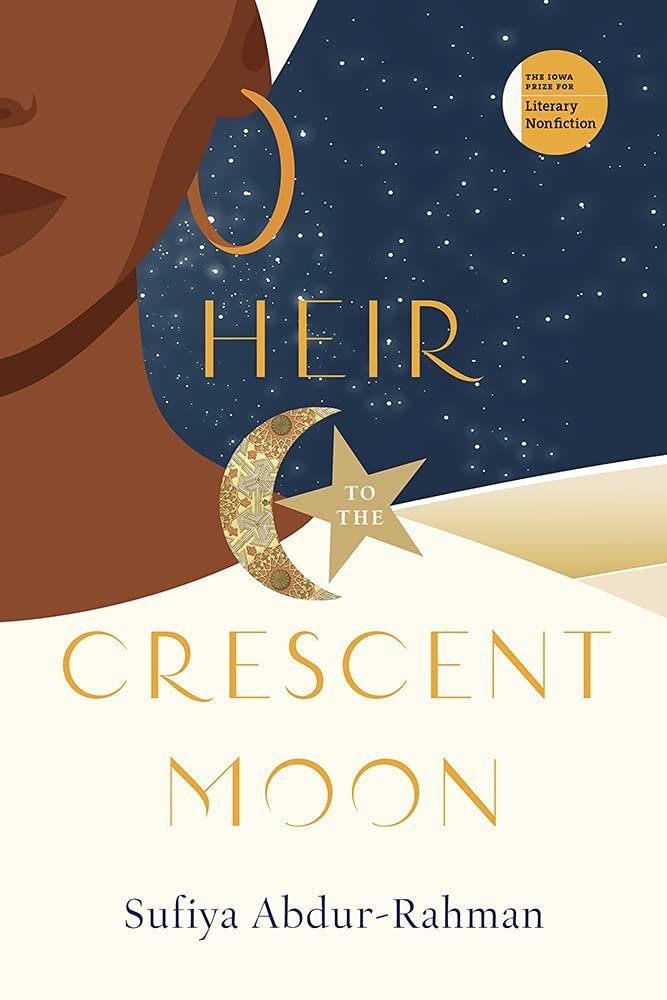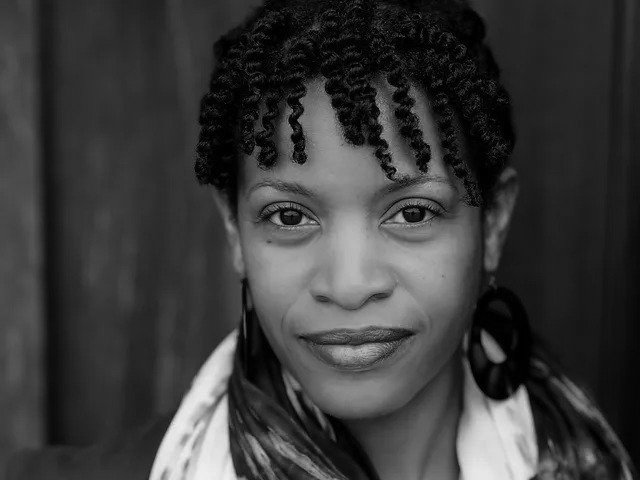An Interview with a Publisher and English Professor, Sufiya Abdur-Rahman
By Piper Sartison
Sufiya Abdur-Rahman is an author, English professor at Washington College, and publisher. Her recent novel is titled Heir to the Crescent Moon (2021; University of Iowa Press), where she writes about her personal experiences growing up in a black Muslim family in America. Sufiya has won the Iowa Prize for Literary Nonfiction and continues to focus on other future writing projects while she pursues her career in teaching.
Sufiya has taught me in two different writing classes at Washington College, and she has provided excellent insight on writing to her students. When I asked to interview her, she kindly agreed, and we set up a zoom call. Over the call, we discussed her book and her impact on the writing community as well as her passion for teaching.
What motivated you to become a writer?
I think I grew up around a lot of storytellers in my family. My grandfather, in particular, was one who would often tell stories about when he grew up in the [Jim Crow South]. He had an interesting way of telling stories about that; they were really engaging, and everyone would gather around to hear what he had to say. And later on, he started to write these stories down and turn them into creative nonfiction pieces. . . . He knew that I liked writing as well so sometimes, he would show me stories and ask [about my opinion]. Over the years, I would work with him on things and help him out with [endings] on pieces that he put together. . . . My mother also is a storyteller. . . . Listening to her tell stories also influenced me to [become] a storyteller [but more in the nonfiction realm].
What inspired you to write about your personal life in Heir to the Crescent Moon?
Initially, I just wanted to tell a story about second generation black Muslims. I felt like there was a story out there that hadn’t been told before and I was interested in finding out enough information about it to be able to write a book. My book idea was more journalistic. [I wanted] to [interview] other people and find out what it was like to grow up as a second-generation black Muslim, find out about their parents’ stories and kind of compile them into this book. I went to grad school with this idea in mind to try to get some direction on how I can turn something that started off small into something bigger. . . . I found a way to incorporate what I was hearing from the folks that I was interviewing into what I was writing about my own family.
What do you love about writing or teaching? Do they go hand in hand? Or would you like to focus on writing more in the future?
I really just enjoy trying to figure out new, different, and interesting ways to express ideas. There [are] so many pieces out there [such as books, articles, and essays], and a lot of what people have in mind to say has already been said. I feel like my challenge as a writer is [to] find some other way to say something that someone hasn’t said before. It’s not always possible, which makes it really hard. . . . When I’m sitting down to write, I feel like the process of trying to discover something new or different or unique within myself and how I express something is what keeps me engaged in it. I really enjoy teaching because I enjoy trying to spark the love of writing in other people, too. In particular young people because [I feel like there are] so many stories out there that need to be told. Everyone has one. Even if you’re not writing about yourself and you’re reporting on other people, you can do the work to try to figure out what their story is and bring that to the floor. The more stories that are out there, the more people get to know about other people and that’s just [what life is all about], getting to know other people, [and] trying to understand this whole human experience more concretely.
How has the writing community influenced your creativity as a writer, English professor, and publisher?
I just went to the associated writing programs conference in Philadelphia where I got the chance to be around a lot of writers, and it was the first time I had been to one of those in a really long time. I was amazed by how huge this conference was. There were panels about so many different topics, all happening at the same time. You really got a chance to see poetry, fiction, nonfiction, and all of these little nuances within each genre; all of these little pockets of different writing communities together. It just made me think about how wide and vast our community is, and how many different ways there are to tell a story, how many different focuses on a story there are, which I found really inspiring.
I think the writing community in an event like that [or on twitter for example] is a very vibrant writing community. You’re always hearing about new projects that are out there; books, essays that you should read. It just keeps people engaged, probably in a way that wasn’t possible without the internet. It’s really just inspiring for me to try to be a part of this community with writers.”
Do you have any advice to aspiring women writers in the community?
My advice to all aspiring writers is to read as much as possible. Read what’s out there, read writers you want to try to be like. [The] best teacher that you can have [is] the work that’s already been published. There’s so much of it, there’s almost no way to really read everything that’s out there, and so the work [that] a young aspiring writer has is to read as much as possible. There’s just a wealth of really great stuff.
You can find Heir to the Crescent Moon at the University of Iowa Press: uipress.uiowa.edu/books/9781609387822/heir-to-the-crescent-moon.
Sufiya Abdur-Rahman’s writing investigates questions of family, identity, race, and religion and, often, how they intersect. Her essays, articles, and criticism have appeared in publications including Catapult, The Common Online, Gay Mag, The Washington Post, Chicago Tribune, and NPR. She has earned Notable distinction in Best American Essays, received fellowships from the Sustainable Arts Foundation, and is a two-time alumnus of VONA writing workshops. She is Creative Nonfiction Editor for Cherry Tree, a national literary journal, at Washington College, where she teaches nonfiction. She lives in Annapolis, Maryland, with her family.
Piper Sartison was born and raised in Calgary, Alberta. Her favorite subject in school was English, and she followed her passion for writing into college. Piper attends Washington College in Maryland and is a sophomore, majoring in English and minoring in Journalism. She is a competing member of the women’s tennis team and writes for The Elm, a local community newspaper. When she is not working or playing tennis, she spends her time with friends, watches movies, or enjoys journaling in her notebook.
*****
Yellow Arrow recently revamped and restructured its Yellow Arrow Journal subscription plan to include two levels. Do you think you are an Avid Reader or a Literary Lover? Find out more about the discounts and goodies involved at yellowarrowpublishing.com/store/yellow-arrow-journal-subscription. Yellow Arrow Publishing is a nonprofit supporting women writers through publication and access to the literary arts.
You can support us as we AWAKEN in a variety of ways: purchase one of our publications from the Yellow Arrow bookstore, join our newsletter, follow us on Facebook, Instagram, or Twitter or subscribe to our YouTube channel. Donations are appreciated via PayPal (staff@yellowarrowpublishing.com), Venmo (@yellowarrowpublishing), or US mail (PO Box 102, Glen Arm, MD 21057). More than anything, messages of support through any one of our channels are greatly appreciated.

